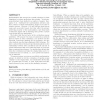Free Online Productivity Tools
i2Speak
i2Symbol
i2OCR
iTex2Img
iWeb2Print
iWeb2Shot
i2Type
iPdf2Split
iPdf2Merge
i2Bopomofo
i2Arabic
i2Style
i2Image
i2PDF
iLatex2Rtf
Sci2ools
212
click to vote
SIGMOD
2005
ACM
2005
ACM
Deriving Private Information from Randomized Data
Randomization has emerged as a useful technique for data disguising in privacy-preserving data mining. Its privacy properties have been studied in a number of papers. Kargupta et al. challenged the randomization schemes, and they pointed out that randomization might not be able to preserve privacy. However, it is still unclear what factors cause such a security breach, how they affect the privacy preserving property of the randomization, and what kinds of data have higher risk of disclosing their private contents even though they are randomized. We believe that the key factor is the correlations among attributes. We propose two data reconstruction methods that are based on data correlations. One method uses the Principal Component Analysis (PCA) technique, and the other method uses the Bayes Estimate (BE) technique. We have conducted theoretical and experimental analysis on the relationship between data correlations and the amount of private information that can be disclosed based our...
Data Correlations | Database | Modified Randomization Scheme | Randomization Schemes | SIGMOD 2005 |
Related Content
| Added | 08 Dec 2009 |
| Updated | 08 Dec 2009 |
| Type | Conference |
| Year | 2005 |
| Where | SIGMOD |
| Authors | Zhengli Huang, Wenliang Du, Biao Chen |
Comments (0)

